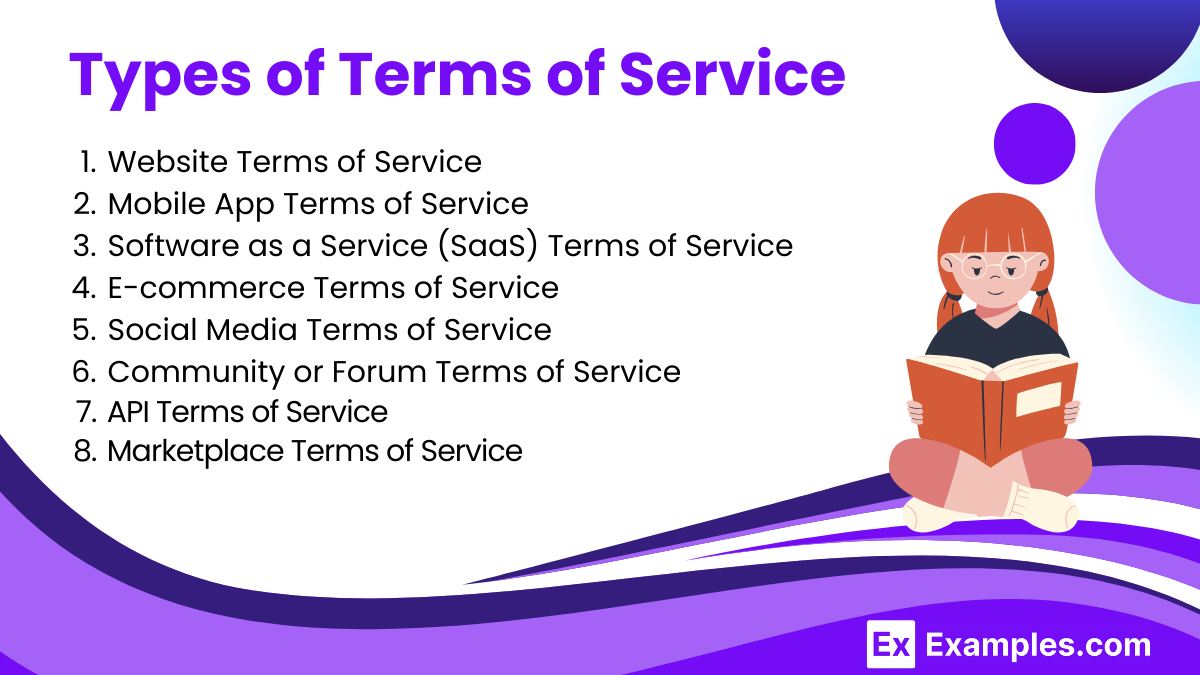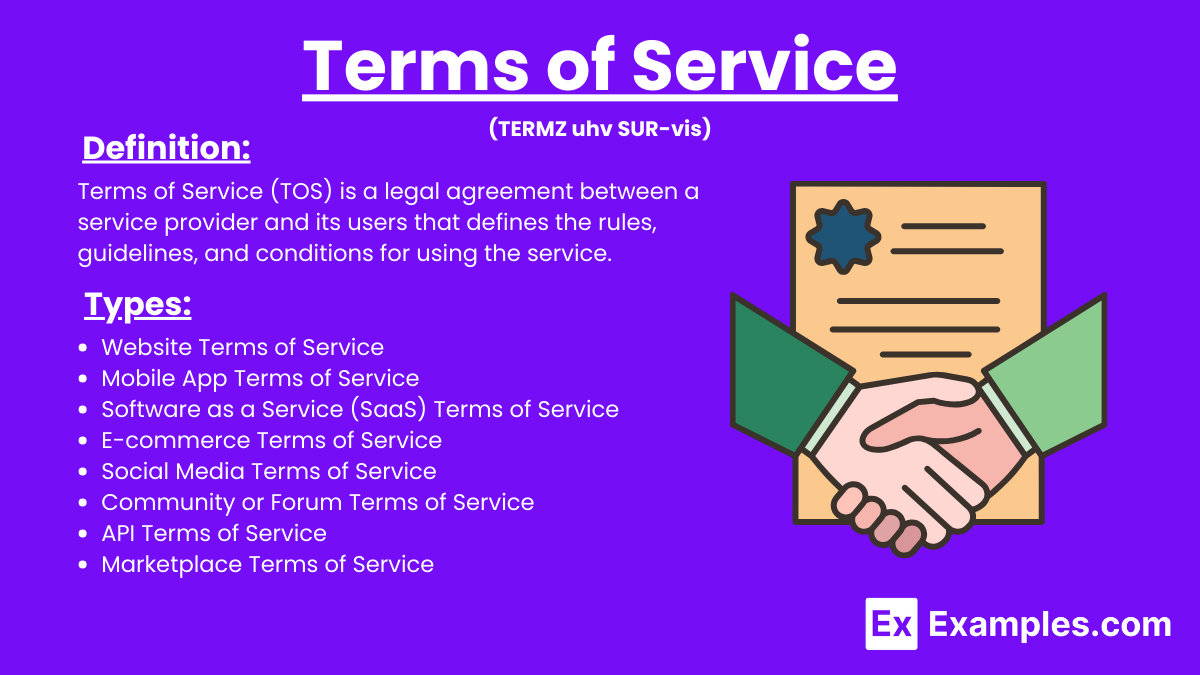15+ Terms of Service Examples to Download
A Terms of Service (TOS), also known as Terms and Conditions or Terms of Use, is a legal document that outlines the rules, responsibilities, and guidelines that users must agree to and follow when using a website, service, or application. This document sets the terms under which the service is provided, covering aspects such as user conduct, intellectual property rights, limitations of liability, privacy policies, and dispute resolution mechanisms. Similar documents include a Services Agreement, which details the terms of service provision between two parties, and an Auto Repair Agreement, which specifies the terms and conditions for vehicle repair services. A Service Agreement Contract is another example, outlining the contractual obligations, responsibilities, and rights of both the service provider and the client.
What is Terms of Service?
Examples of Terms of Service
- Acceptance of Terms
- Modification of Terms
- User Responsibilities
- Account Registration
- Privacy Policy
- Intellectual Property Rights
- Prohibited Activities
- Termination of Service
- Dispute Resolution
- Limitation of Liability
- Third-Party Links
- Governing Law
- User-Generated Content
- Payment and Fees
- Changes to Services
Types of Terms of Service

1. Website Terms of Service
- Description: Governs the use of a website, outlining user responsibilities and acceptable behavior.
- Key Elements: User conduct, content ownership, privacy policy, disclaimers, and limitations of liability.
2. Mobile App Terms of Service
- Description: Specific to mobile applications, detailing the rules for using the app.
- Key Elements: App usage rights, in-app purchases, user-generated content, data collection, and permissions.
3. Software as a Service (SaaS) Terms of Service
- Description: Applicable to cloud-based services, defining access and usage conditions.
- Key Elements: Subscription terms, data security, service levels, user obligations, and termination conditions.
4. E-commerce Terms of Service
- Description: For online shopping platforms, covering transactions and customer interactions.
- Key Elements: Payment terms, return and refund policies, shipping information, and customer account management.
5. Social Media Terms of Service
- Description: Governs user interactions and content sharing on social media platforms.
- Key Elements: Content moderation, user privacy, advertising policies, and intellectual property rights.
6. Community or Forum Terms of Service
- Description: Rules for participating in online communities or forums.
- Key Elements: Posting guidelines, moderation policies, member behavior, and dispute resolution.
7. API Terms of Service
- Description: Defines the conditions for using an API (Application Programming Interface).
- Key Elements: API usage limits, developer responsibilities, data usage, and service updates.
8. Marketplace Terms of Service
- Description: Governs interactions between buyers and sellers on a marketplace platform.
- Key Elements: Seller policies, buyer protections, dispute resolution, and transaction fees.
Importance of Terms of Service
The Terms of Service (TOS) are crucial as they establish the legal framework and guidelines for the interaction between a service provider and its users. By clearly defining the rules, responsibilities, and expectations, the TOS protect both parties by minimizing misunderstandings and potential disputes. They ensure compliance with relevant laws and regulations, provide a basis for enforcing policies, and help manage risks by outlining limitations of liability and user obligations. Additionally, TOS foster transparency and trust by informing users of their rights, how their data will be used, and the consequences of non-compliance, thereby promoting a fair and secure online environment.
Similar to TOS, a Service Agreement details the terms of service provision between two parties, while a Professional Services Agreement specifies the terms and conditions for professional services, ensuring both parties understand their obligations and rights.
Update of Terms of Service
Updating the Terms of Service (TOS) involves revising the legal agreement to reflect changes in policies, regulations, or service features. This process ensures that the terms remain current and relevant, protecting both the service provider and users.
Similar to updating a TOS, other agreements such as a Cleaning Service Proposal, a Consulting Agreement, and an Event Planner Contract may also require periodic revisions to ensure they accurately reflect the current terms and conditions of the services provided. Keeping these documents updated is crucial for maintaining clear and enforceable agreements that protect the interests of all parties involved.
Steps in Updating Terms of Service
- Identify Changes: Determine what needs to be updated, such as new features, legal requirements, or company policies.
- Draft Revisions: Clearly and precisely draft the new terms, highlighting any significant changes.
- Review Legal Compliance: Ensure the updated TOS complies with relevant laws and regulations.
- Notify Users: Inform users of the changes, providing a clear summary and the effective date of the new terms.
- Obtain Consent: Require users to accept the updated terms, often through a click-wrap agreement or continued use of the service.
Uses of Terms of Service
- Establishing Legal Protection: Terms of Service provide legal protection for service providers by clearly defining the rules and limitations of using their service. This helps to minimize legal risks and potential disputes with users.
- Defining User Responsibilities: ToS documents outline what is expected of users when accessing and using the service. This includes acceptable behavior, prohibited activities, and guidelines for content submission. By setting clear expectations, providers can ensure a safe and respectful environment for all users.
- Limiting Liability: Service providers use ToS to limit their liability for issues that may arise from using their service, such as data loss, service interruptions, or third-party content. This helps protect the provider from being held responsible for circumstances beyond their control.
- Protecting Intellectual Property: ToS agreements include provisions that protect the provider’s intellectual property, such as trademarks, copyrights, and proprietary content. This ensures that users understand the ownership rights and restrictions related to the use of the provider’s intellectual property.
- Governing Dispute Resolution: Terms of Service often include clauses that specify how disputes between the provider and users will be resolved. This may involve arbitration, mediation, or jurisdictional requirements, helping to streamline the resolution process and reduce litigation costs.
- Privacy and Data Protection: ToS documents typically outline how user data will be collected, used, and protected. This is crucial for complying with privacy laws and regulations, such as GDPR or CCPA, and for building trust with users by transparently addressing data privacy concerns.
- Service Modification and Termination: Providers use ToS to reserve the right to modify or terminate the service at any time. This includes the ability to update features, change pricing, or discontinue the service altogether. Clear communication of these terms helps manage user expectations and reduce potential conflicts.
Who should read the Terms of Service?
Every user should read them to understand their rights and obligations when using a service.
Can Terms of Service change?
Yes, companies can update their Terms of Service, and users are typically notified of significant changes.
What happens if I violate the Terms of Service?
Violating the Terms of Service can result in account suspension, termination, or legal action.
Are Terms of Service legally binding?
Yes, once you agree to them, they become a legally binding contract between you and the service provider.
How do I agree to the Terms of Service?
You usually agree by clicking a checkbox or button when creating an account or using the service.
What should I look for in the Terms of Service?
Look for information on user rights, prohibited actions, privacy policies, and dispute resolution.
Can I negotiate the Terms of Service?
Generally, no. Most companies offer standard Terms of Service that apply equally to all users.
Do Terms of Service include a privacy policy?
They often reference or include a privacy policy detailing how user data is collected, used, and protected.
What is a disclaimer in the Terms of Service?
A disclaimer limits the service provider’s liability for issues like errors, outages, or damages arising from using the service.
How do Terms of Service affect refunds?
They outline the conditions under which refunds are issued, including eligibility and the process for requesting one.


